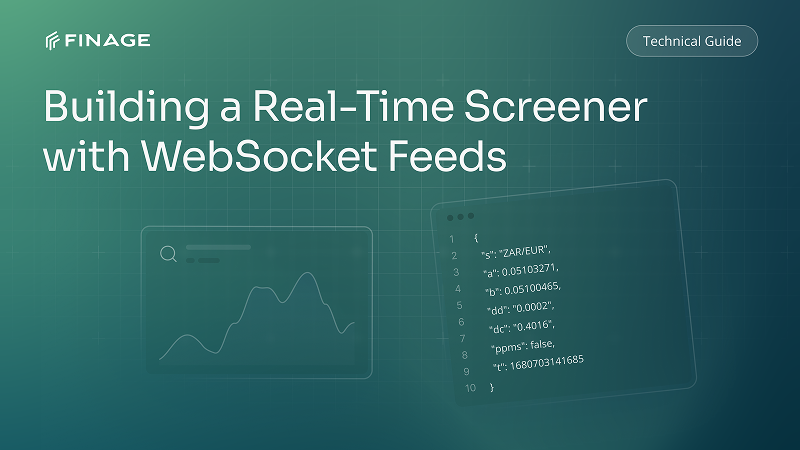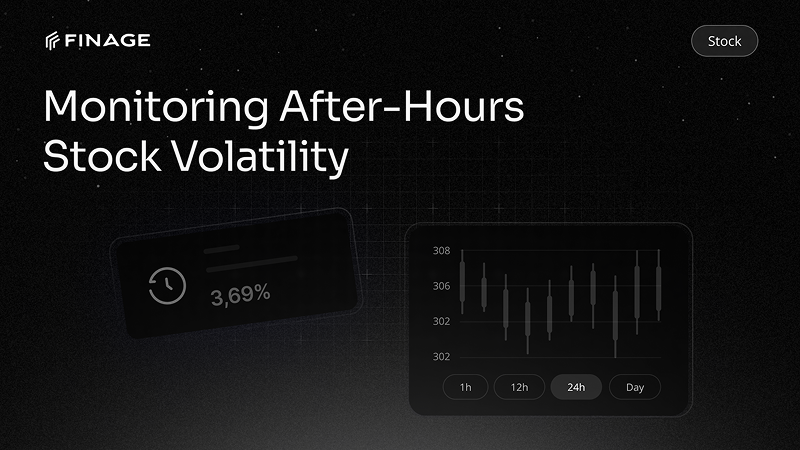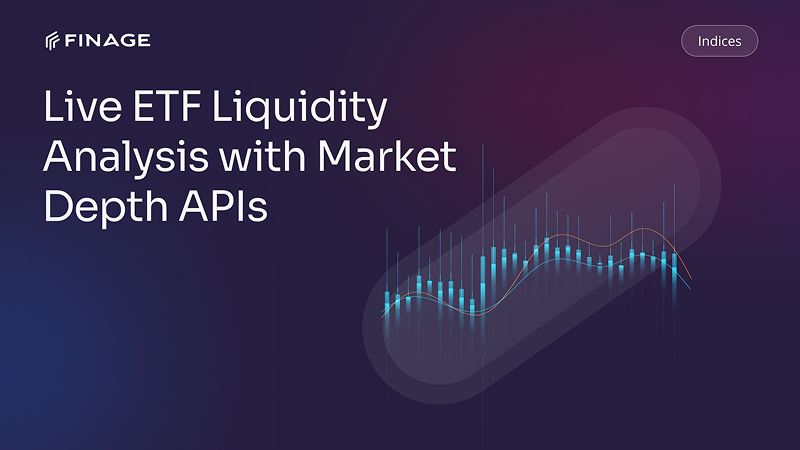How Finage Helps Financial Startups Meet MiFID II, FCA, and SEC Compliance
7 min read • July 5, 2025

Introduction
If you're building a fintech startup, you're not just coding products—you’re navigating regulations. Whether you operate in the EU, UK, or US, compliance is no longer optional. It's a launch requirement.
From MiFID II in Europe to FCA obligations in the UK and SEC rules in the US, regulatory frameworks demand that financial apps meet strict standards on data accuracy, audit trails, and investor protection. For young companies, that can feel overwhelming.
But the right market data partner can simplify the entire process.
In this post, we’ll explore how Finage helps financial startups stay compliant from day one. You’ll learn how our data infrastructure aligns with key regulatory standards—and how it can help reduce risk, satisfy auditors, and accelerate go-to-market timelines.
Compliance doesn't have to slow you down. With Finage, it can be built in from the start.
Table of Contents
- Understanding MiFID II, FCA, and SEC Data Rules
- Where Startups Struggle with Market Data Compliance
- Finage’s Role in Ensuring Audit-Ready Data
- Supporting Best Execution and Recordkeeping
- Compliant APIs for Global Use Cases
- Final Thoughts — Grow Fast Without Cutting Corners
1. Understanding MiFID II, FCA, and SEC Data Rules
Before we dive into solutions, it’s important to understand what regulators actually require—especially around market data usage, reporting, and transparency.
MiFID II (EU)
The Markets in Financial Instruments Directive II is one of the most comprehensive regulatory frameworks in the world. For fintech startups, MiFID II enforces:
- Best execution: Firms must prove they executed trades under the most favorable conditions for clients. This means tracking and storing real-time bid/ask data at the moment of each trade.
- Transaction reporting: Market data must be timestamped and traceable.
- Pre- and post-trade transparency: Quotes and executions must be available to regulators if needed.
FCA (UK)
The Financial Conduct Authority sets similar expectations, including:
- Fair client treatment: Using consistent, trustworthy pricing sources.
- Data integrity and auditability: All financial information used in decision-making must be stored and verifiable.
- Regulated activity thresholds: Even data-driven insights can cross regulatory boundaries.
SEC (US)
The U.S. Securities and Exchange Commission emphasizes:
- Accurate disclosures: Any investment product or fintech platform must disclose how pricing is determined.
- Real-time market data handling: Especially for platforms offering trading or portfolio tracking tools.
- Cybersecurity and system integrity: Applies to how APIs handle and store market data.
In short, all three regulators require that startups prove their market data is:
- Reliable
- Timely
- Auditable
That’s where Finage begins to make a difference.
2. Where Startups Struggle with Market Data Compliance
Fintech startups often move fast, iterating on product features, UX, and growth metrics. But when it comes to market data—especially under regulatory pressure—cutting corners can backfire.
Here’s where most startups encounter issues:
Inconsistent or Unverified Data Sources
Using free APIs or scraping prices from exchange frontends might seem harmless at first, but this data is often unaudited, delayed, or inconsistent—making it unusable in a regulated environment.
No Timestamping or Logging
Many startups overlook the importance of tracking exactly when market data was retrieved or used. Without reliable timestamps, it’s nearly impossible to meet best execution or reporting obligations.
Lack of Historical Data Archiving
Regulators like MiFID II and the SEC require firms to keep a historical record of all price data used in decision-making—for years. If your startup doesn’t store that data securely, you’re already non-compliant.
Multiple Data Feeds Without Normalization
Using different feeds for different markets (e.g., one for crypto, one for stocks, one for FX) introduces formatting issues. Without normalization, this makes cross-asset analysis error-prone and risky.
No Proof of Data Integrity
APIs without secure delivery, rate-limiting, and redundancy can introduce gaps, which may leave your platform open to disputes or enforcement actions.
Compliance issues don’t always come from bad intent—they come from missing infrastructure.
3. Finage’s Role in Ensuring Audit-Ready Data
Finage is built for financial products that need more than just raw price feeds. We help fintech startups meet the strictest compliance standards—by providing a data foundation that’s reliable, consistent, and regulation-ready.
Timestamped Market Data
Every data point delivered via Finage APIs is timestamped with millisecond precision. Whether you’re tracking trades, order book updates, or OHLCV candles, you get a clear record of when the data was retrieved and how fresh it was—an essential requirement for MiFID II and FCA audits.
Secure Delivery Channels
Finage offers HTTPS-protected REST endpoints and robust WebSocket connections that ensure data integrity in real time. For sensitive applications, this means reduced risk of packet loss, injection, or timing errors.
Historical Data Archiving
Need to prove what market conditions were like on a specific date? Finage provides long-term access to historical data across stocks, crypto, and Forex—with precise timestamps. You can store this in your own logs or query as needed for regulatory reviews.
Consistent Formatting Across Markets
All data—whether from US Markets, Uniswap, or FX markets—is delivered in a normalized JSON schema. This simplifies compliance reporting, cross-asset analytics, and regulatory filings that require structured documentation.
Proven Use in Regulated Environments
Finage is already integrated by financial firms operating under FCA and SEC oversight. Our infrastructure is built with real compliance cases in mind—not just developer convenience.
With Finage, compliance isn’t an afterthought. It’s built into every request.
4. Supporting Best Execution and Recordkeeping
Regulators don’t just want firms to deliver good outcomes—they want proof. That’s why both best execution and recordkeeping are fundamental to MiFID II, FCA, and SEC compliance.
Here’s how Finage helps startups meet both expectations with confidence:
Transparent Bid/Ask Snapshots
Finage provides real-time bid and ask prices from multiple exchanges. This enables your platform to:
- Capture the exact market condition at the time of each trade
- Justify why a particular price or route was selected
- Document that the trade was executed in line with available liquidity
This level of granularity is essential for compliance with MiFID II’s best execution policies and can support your internal audit trail or client dispute resolution processes.
Long-Term Price Storage
Through our historical endpoints, you can retrieve precise price points at any given time—including:
- OHLCV data (Open, High, Low, Close, Volume)
- Intraday trades and ticks
- Forex rates, crypto trades, and stock prices
Startups can store this information internally or retrieve it via Finage’s historical APIs when needed—perfect for audits, customer service records, or regulatory inquiries.
Log-Friendly Structuring
Finage data is easy to index, compress, and store in logging frameworks like ElasticSearch or time-series databases. Each API call can be traced back to a specific timestamp and API key, simplifying your recordkeeping pipeline.
With Finage, you’re not just reacting to compliance—you’re prepared for it in advance.
5. Compliant APIs for Global Use Cases
For fintech startups serving users across regions, compliance isn’t just a local issue—it’s global. What works for the SEC may not satisfy the FCA or MiFID II. Finage solves this by offering APIs that are flexible, transparent, and consistent across asset classes and jurisdictions.
Unified Market Data Infrastructure
Instead of managing multiple vendors for different assets, Finage offers a single API suite for:
- Equities (US, UK, EU markets)
- Crypto (CEX and DEX)
- Forex pairs
- Commodities and indices
All feeds follow consistent formatting and security practices, reducing your integration burden and making internal compliance reviews easier.
Built-in Rate Limiting and Authentication
Every request is authenticated via API key, ensuring traceability. Rate limits are clearly defined and monitored to prevent misuse—important for meeting operational integrity expectations under SEC and MiFID II guidelines.
GDPR-Ready and Audit-Trail Friendly
Operating in the EU or serving EU citizens? Finage’s data services are GDPR-compliant and support your internal logs for handling and storing personal financial data alongside market data.
Global Data Centers, Local Latency
Finage operates distributed infrastructure to ensure low-latency access for apps in the US, UK, and Europe—helping you meet time-sensitive regulatory demands like timestamp accuracy, especially under MiFID II.
Finage is designed not just for scale—but for regulatory clarity at every stage of that growth.
6. Final Thoughts — Grow Fast Without Cutting Corners
Regulatory compliance isn’t just about checking boxes. For fintech startups, it’s the difference between scaling with confidence and stalling under scrutiny. Whether you're preparing for FCA oversight, navigating MiFID II audits, or entering the SEC’s domain, your data infrastructure needs to be airtight.
Finage helps startups skip the guesswork.
With real-time, historical, and WebSocket APIs that align with the world’s strictest financial regulations, Finage gives you:
- Timestamped, audit-ready feeds
- Unified access to crypto, Forex, stocks, and indices
- Transparent infrastructure that satisfies global regulators
- Scalable tools that grow with your product—not against it
Don’t treat compliance as a blocker—treat it as a competitive advantage. With Finage, you can move fast and stay compliant.
Claim Your Free API Key Today
Access stock, forex and crypto market data with a free API key—no credit card required.

Stay Informed, Stay Ahead
Finage Blog: Data-Driven Insights & Ideas
Discover company news, announcements, updates, guides and more


